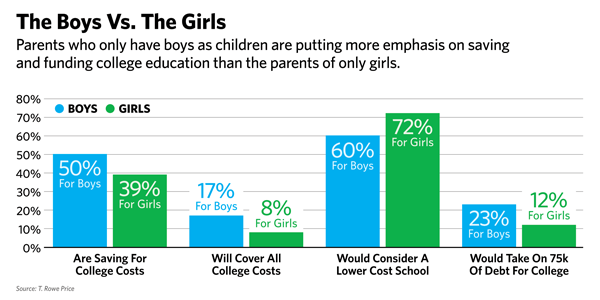Parents who only have boys as children are putting more emphasis on saving and funding college education than the parents of only girls, according to a national survey of parents of children aged 8 to 14 that was sponsored by Baltimore-based T. Rowe Price.
While 50 percent of the parents of all boys said they had saved for college expenses, only 39 percent of the parents of all girls said the same.
Researchers surveyed parents—both single parents and at least one member of two-parent households—in 1,014 households across the nation. Of these, 15 percent were households with only girl children, 24 percent with only boy children and 61 percent with children of both genders.
Among parents of all boys, 83 percent report contributing on at least a monthly basis to college savings, compared to 70 percent of the parents of all girls.
The data was released at a time when the issue of saving for college for female students is of increasing importance: Among students in the nation's colleges, women outnumber men by about a 3-to-2 ratio, according to a spring report by the National Student Clearinghouse Research Center.
“I think there’s a lack of understanding the big picture at work here in terms of the many issues girls will face growing up. Not saving an equal amount or more for their girls leads directly to the pay disparity, the income disparity and the wealth gap faced by women in their careers,” says Jocelyn Wright, assistant professor of women’s studies at the Bryn Mawr, Pa.-based American College “The lack of overall financial awareness compounds many of the stereotypes that affect men and women today.”
“If, today, you asked parents straight up on the street whether they’d pay more for a boy to go to school than they would for a girl, I don’t think you’d find anyone who would say yes,” says Jamie Hopkins, associate professor of taxation at The American College. “This isn’t something that most people are doing openly or intentionally.”
Among other survey results, 17 percent of all-boy parents said they would cover all of the college expense, compared to only 8 percent of the parents of all girls. A child’s gender may presage how his or her parents will save for college, a new survey says.
A child’s gender may presage how his or her parents will save for college, a new survey says.
 Two professors who read the survey report said the results point to a gender gap in financial planning that often isn't recognized.
Two professors who read the survey report said the results point to a gender gap in financial planning that often isn't recognized.
Do Parents Favor Boys When Saving For College?
October 17, 2017
« Previous Article
| Next Article »
Login in order to post a comment








